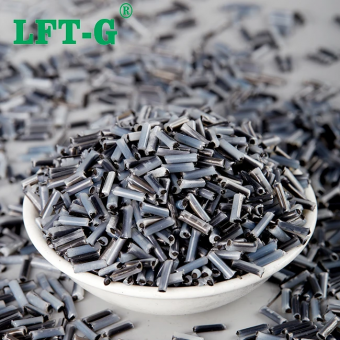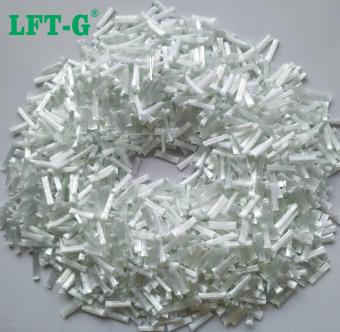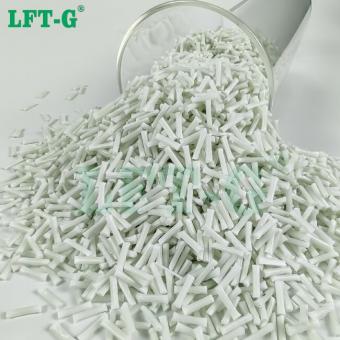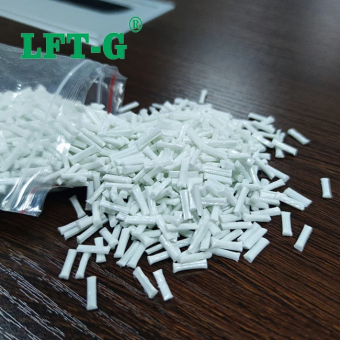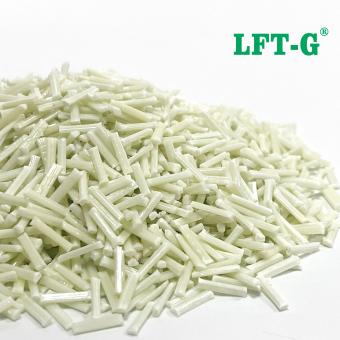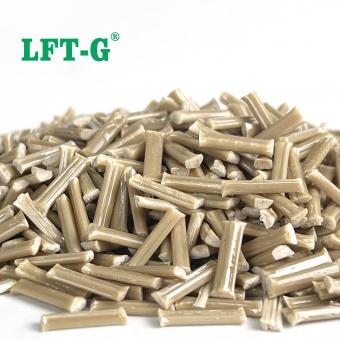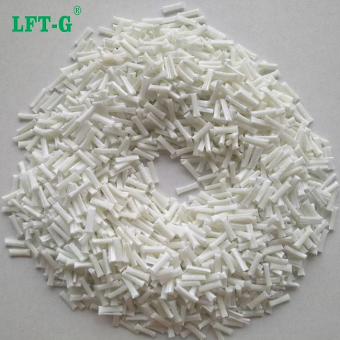Long glass fiber has high strength, high rigidity, corrosion resistance, harsh environment suitability and low cost. When the resin matrix is impregnated and extruded into pellets ,Also called Long Glass Fiber Polymer it has good mechanical properties.
-
Xiamen LFT-G Homopolymer Polypropylene reinforced Long Glass Fiber compondsHPP is Homopolymer polypropylene
- Homopolymer Polypropylene HPP GF30
- High impact material polypropylene high
- PP plastic thermoplastic fiberglass
- Sample provide products polypropene
- 25kg/bag PP glass fiber filament
- Environmental friendly plastic
Tags :
-
LFT Polypropylene PP filling long glass fiber 20%-60% high performance thermoplastic resinPP material Polypropylene, PP for short, is a polymer of propylene by adding polymerization. White waxy material, transparent and light in appearance. Polypropylene is a thermoplastic synthetic resin with excellent properties. It is a colorless translucent thermoplastic lightweight general plastic with chemical resistance, heat resistance, electrical insulation, high strength mechanical properties and good high wear-resisting machining properties. PP-LGF material PP plus glass fiber is by adding glass fiber reinforced PP material, due to the addition of glass fiber, limited the mutual movement between polymer chains of PP plastic, therefore, the shrinkage rate of glass fiber reinforced PP (PP plus glass fiber) decreases, rigidity, impact resistance, tensile strength, compression strength, bending strength and flame retardant are improved. The mechanical properties of PP plus glass fiber specifically, tensile strength reached 65MPa--90MPa, bending strength reached 70MPa--20MPa, bending modulus reached 3000MPa--4500MPa, such mechanical strength can be completely comparable with ABS and enhanced ABS products, and more heat resistant. Generally, the heat resistance temperature of ABS and reinforced ABS is between 80℃--98℃, and the heat resistance temperature of glass fiber reinforced PP material can reach 135℃--145℃, and even 150 degrees can withstand more than 1000 hours. Compared with SGF(Short Glass Fiber) TDS for reference only Application of PP-Long glass fiber PP filling long glass fiber material, can be used to make refrigerators, air conditioning and other refrigeration machines in the axial flow fan and fan. In addition, it can also be used to manufacture the inner drum of high speed washing machine, wave wheel, belt wheel to adapt to its high mechanical performance requirements, used for rice cooker base and handle, electronic microwave oven and other places with high temperature resistance requirements, generally speaking, most glass fiber reinforced PP material is used in the structural parts of the product, is a kind of structural engineering materials. Cases Washing machine parts Automobile front end parts Scooter parts Frequently asked questions 1. Does long glass fiber injection have special requirements for injection molding machines and molds? A. There are certainly requirements. Especially from the product design structure, as well as the injection molding machine screw nozzle and mold structure injection molding process must consider the requirements of long fiber. 2. After long glass fiber reinforced, glass fiber can enter the surface of the plastic product during injection molding process, so that the surface of the product become rough and floating fiber. How to make the surface of the material smoothly? A. During injection molding process need to ensure that the plastic particles are well plasticized and dispersed, also ensure that the drying of plastic particles have no moisture removal, mold temperature adjustment to the appropriate temperature, mold surface is polished in place. 3. Can products with appearance requirements be made of long-fiber materials? A. The main feature of LFT-G thermoplastic long glass fiber and long carbon is to show the mechanical properties. If the customer has bright or other requirements for the appearance of the product, it needs to be evaluated in combination with specific products,
- long fibre reinforced thermoplastics
- long fiber compounds pp
- pp lgf40
- long glass fiber polypropylene
- long fiber composite PP granules
- PP LFT Compounds polymers
Tags :
-
LFT Polyphenylene sulfide PPS Long Glass fiber Reinforced PPS PelletsEngineer PPS filled Long Glass fiber Reinforcedis one kind of engineering modifeid plastic materials of long glass fiber reinforced PPS
- PPS filled Long glass fiber
- Polyphenylene sulfide PPS anti aging
- PPS Polymer pellets
- Modified PPS
- Thermoplastic Reinforced plastic PPS
Tags :
-
Xiamen LFT MXD6 resin long glass fiber reinforcement polymer compoundsMXD6 resin granules filling long glass fiber compounds pellets factory price
- MXD6 resin polymer thermoplastic
- MXD6 pellets made in China
- MXD6 polymer imdustrial use good price
- plastic raw material MXD6 GF30 glass fiber
- MXD6 granules reinforced plastic
- plastic MXD6 lgf40 sample available
Tags :
-
LFT-G modified ABS compounds Long Glass Fiber for automotive partsABS material Acrylonitrile-butadiene styrene (ABS) resin is an opaque amorphous thermoplastic engineering plastic with complex two-phase structure. It is composed of styrene, acrylonitrile and butadiene in different proportions. In the 1970s, it began to be recognized by the public and began to be used. In the 1990s, the market demand grew rapidly. At present, it should be used in domestic and foreign markets, especially in construction, home appliances, automobiles and other industries. ABS-LGF Long glass fiber is widely used in engineering plastics. Reinforced ABS composites are made by adding a certain percentage of glass fiber, with the addition of 30% to 50% glass fiber being the most common. So as to improve the mechanical properties of ABS. Such as tensile properties, bending properties, and the corresponding molding shrinkage rate is not reduced, so that the material will not stress cracking. Advantages: 1. Long glass fiber reinforced, glass fiber is a high temperature resistant material, therefore, the heat resistant temperature of reinforced plastic is much higher than before without glass fiber, especially nylon plastics 2. After long glass fiber reinforcement, due to the addition of long glass fiber, the mutual movement between polymer chains of plastic is limited, therefore, the shrinkage rate of reinforced plastics decreases a lot, and the rigidity is greatly improved. 3. After long glass fiber reinforcement, reinforced plastics will not stress crack, at the same time, the anti-impact performance of plastics is improved a lot. 4. After long glass fiber reinforcement, glass fiber is a high strength material, which also greatly improves the strength of plastic, such as: tensile strength, compression strength, bending strength, improve a lot. 5. Long glass fiber reinforced after, due to the addition of glass fiber and other additives, the combustion performance of reinforced plastics decreased a lot, most of the material can not ignite, is a kind of flame retardant material. Datasheet for reference only Processing flow Cases About Xiamen LFT-G Xiamen LFT composite plastic Co., Ltd. is a brand-name company that focuses on LFT&LFRT. Long Glass Fiber Series(LGF) & Long Carbon Fiber Series(LCF). The company's thermoplastic LFT can be used for LFT-G injection molding and extrusion, and can also be used for LFT-D molding. It can be produced according to customer requirements: 5~25mm length. The company's long-fiber continuous infiltration reinforced thermoplastics have passed ISO9001 & 16949 system certification, and the products have obtained lots of national trademarks and patents.
- Modified material lft injection molding
- ABS compounds long glass fiber
- lgf injection mold abs for engineering
- reinforced material abs filling lgf
- ABS-LGF30 thermoplastic resin
- Thermoplastic resin ABS
Tags :
-
Xiamen LFT-G reinforced Polyphthalamide filling long glass fiber injection moldingPPA-LGF PPA, full name polyphthalamide, is a semi-aromatic polyamide with no less than 55% terephthalic acid or phthalic acid as raw material, commonly known as aromatic high temperature nylon. PPA has better mechanical properties and high temperature resistance compared to traditional aliphatic nylon (PA6/PA66) materials. PPA materials have relatively low water absorption, good dimensional stability and good corrosion resistance. Glass fiber reinforced PPA composites have high temperature resistance, high strength and low density, and are considered to be the best resin to replace steel with plastic. Compared with traditional short fiber reinforced pellets, long glass fiber reinforced PPA composites have better physical and mechanical properties. Application Because high-temperature nylon can withstand high strength, high loads, and high temperatures in harsh environments, it is ideal for applications in engine areas (such as engine covers, switches, and connectors) as well as transmission systems (such as bearing cages), air systems (such as exhaust control systems), and air intake units. PPA engineering plastic is a high performance engineering plastic reinforced by fiber with high temperature nylon as the base material. The structure and crystalline characteristics of high-temperature nylon make it have more characteristics and excellent overall performance than nylon 66 and nylon 6 and other engineering plastics: strong rigidity, high hardness, high temperature resistance, good chemical resistance and low water absorption, dimensional accuracy and stability and low warpage, excellent fatigue resistance, in many fields including automotive parts, mechanical parts and electrical and electronic parts used in motor parts It is widely used in many fields including automotive parts, mechanical parts and electrical and electronic parts for motor parts, circuit breakers, etc. Other materials you may wonder About us Xiamen LFT composite plastic Co., Ltd is a brand-name company that focuses on LFT&LFRT. Long Glass Fiber Series (LGF) & Long Carbon Fiber Series (LCF). The company's thermoplastic LFT can be used for LFT-G injection molding and extrusion, and can also be used for LFT-D molding. It can be produced according to customer requirements: 5~25mm in length. The company's continuous infiltration reinforced thermoplastics have passed ISO9001&16949 system certification, and the products have obtained lots of national trademarks and patents. We will offer you 1. LFT&LFRT material technical parameters and leading edge design 2. Mold front design and recommendations 3. Provide technical support such as injection molding and extrusion molding
- ppa granules lgf30 GF PPA virgin grade
- best long glass fiber ppa lgf30 granules
- Polymer lgf PPA Virgin pure materials
- pla lgf30 pla granule price good price
- ppa granules lgf30 self factory made
- ppa lft glass fiber fiberglass modified plastic
Tags :
-
Xiamen LFT MXD6 filling Long glass fiber high toughness injection moldingMXD6 Polyadipyl-m-benzoylamine, abbreviated as mxd6, resin has higher mechanical strength and modulus than other engineering plastics, is also a special high barrier nylon material. Although the barrier of mxd6 is slightly worse than that of pvdc and evoh, its barrier is not affected by temperature and humidity, which is especially suitable for high temperature and humid occasions. In today's barrier packaging and plastic instead of steel general trend, nylon mxd6 has become one of the most eye-catching new plastic varieties. Structure performance: MXD6 nylon material has high strength, high rigidity, high thermal deformation temperature, small thermal expansion coefficient; Dimensional stability, low water absorption rate and small size change after water absorption, mechanical strength changes less; Forming shrinkage is small, suitable for precision forming processing; Excellent coating performance, especially suitable for high temperature surface coating; Excellent barrier to oxygen, carbon dioxide and other gases. Excellent mechanical and thermal properties and high strength, high modulus and heat resistance, high barrier, excellent cooking resistance. MXD6-LGF MXD6 can be compounded with glass fiber for use in fiberglass reinforced materials containing 50-60% glass fiber for exceptional strength and stiffness. Even when filled with high glass content, its smooth, resin-rich surface produces a fibre-free high gloss surface, ideal for painting, metal-plating, or creating naturally reflective shells. 1. Suitable for high liquidity of thin wall It is a very fluid resin that can easily fill thin walls as thin as 0.5 mm thick even when the glass fiber content is as high as 60%. 2. Excellent surface finish A resin-rich perfect surface has a highly polished appearance, even with a high glass fiber content. 3. High strength and stiffness The tensile and flexural strength of MXD6 is similar to that of many cast metals and alloys with the addition of 50-60% glass fiber reinforced material. 4. Good dimensional stability At ambient temperatures, the linear expansion coefficient (CLTE) of MXD6 glass fiber composites is similar to that of many cast metals and alloys. Strong reproducibility due to low shrinkage and the ability to maintain tight tolerances (length tolerances as low as ± 0.05% if properly formed). MXD6 replaces metal to produce high-quality structural parts for automobiles, electronics and electrical appliances In automobile parts, many occasions require material products with high mechanical strength and good oil resistance, and can be used in the range of 120 ~ 160℃ for a long time. Glass fiber reinforced MXD6 heat resistant temperature up to 225℃, high rate of strength retention at high temperature, can be used in the cylinder block, cylinder head, piston, synchronous gear, etc. MXD6/PPO alloy has high temperature resistance, high strength, oil resistance, wear resistance, good dimensional stability and other properties, can be used for the vertical outer plate of the automobile body, front and rear fenders, wheel covers and almost can not use steel plate stamping forming curved parts and automobile chassis. Datasheet for reference Application fileds Production process Xiamen LFT composite plastic Co., Ltd Q. How to choose the fiber content of the product? Is the larger product suitable for higher fiber content material? A. This is not absolute. The content of glass fiber is not more is better. The suitable content is just to meet the requirements of each products. Q. Under what circumstances can long fiber replace short fiber? What are the common alternative materials? A. Traditional staple fiber materials can be replaced with long glass fiber and long carbon fiber LFT materials in the case of customers whose mechanical properties cannot be met or where higher metal substitutes are desired. For example, PP long glass fiber is often replacing nylon reinforced glass fiber, and nylon long glass fiber is replacing PPS series. Q. Does long glass fiber and long carbon fiber injection have special requirements for injection molding machines and molds? A. There are certainly requirements. Especially from the product design structure, as well as the injection molding machine screw nozzle and mold structure injection molding process must consider the requirements of long fiber.
- polyadipyl-m-benzoylamine LGF
- MXD6 long fiber glass composite
- Modified MXD6 lgf manufacturer direct sell
- MXD6 compounds long glass fiber
- MXD6-NA-LGF30 best price whole sell
- lft-g MXD6 fiber filled GF 20%-60%
Tags :
-
Xiamen LFT PLA Polylactic acid compounds long glass fiber thermoplastic resin for engineeringPLA plastic PLA is a non-natural polyester, which is considered as one of the most promising "green plastics" because of its excellent properties such as biocompatibility, biodegradability and high mechanical strength. PLA has good degradability and can be completely degraded by microorganisms. Products made of PLA can be completely degraded to CO2 and water after use, and are non-toxic and non-irritating. PLA has similar mechanical properties to polypropylene, while its gloss, clarity and processability are similar to polystyrene, and its processing temperature is lower than that of polyolefin. PLA can be processed into various packaging materials, fibers and nonwovens through injection molding, extrusion, blistering, blow molding, spinning and other general plastic processing methods, and PLA has been widely used in disposable plastic products. In addition, PLA can also be widely used in chemical, medical, pharmaceutical and 3D printing industries. It is now increasingly recognized that PLA polyesters will play a key role in solving the plastic pollution problem. PLA reinoforced plastic Glass fiber (English name: glass fiber or fiberglass) is an inorganic non-metallic material with excellent performance, the advantages of good insulation, heat resistance, good corrosion resistance, and high mechanical strength. One of the main uses of glass fiber for the reinforcement of composite materials. Long glass fiber generally refers to the length of more than 10mm glass fiber. Long Glass Fiber Reinforced PLA plastic refers to modified PLA composites containing glass fiber lengths of 10 to 25 mm, which are formed into a three-dimensional structure with glass fiber lengths greater than 3.1 mm through injection molding and other processes, and is referred to as Long Glass Fiber PLA, abbreviated as LGFPLA. fiber reinforce thermoplastic). From the material definition, LGFPLA is a kind of LFT. Generally, they are columnar particles of 12mm or 25mm in length and about 3mm in diameter. The pellets of about 12mm length are mainly used for injection molding, while the pellets of about 25mm length are mainly used for compression molding. In these pellets, the glass fiber has the same length as the pellets, and the glass fiber content can vary from 20% to 60%, and the color of the pellets can be color-matched according to customer requirements. LGF & SGF LFT has the following advantages over short fiber reinforced thermoplastic composites: - Longer fiber length, which significantly improves the mechanical properties of the products. - High specific stiffness and specific strength, good impact resistance, especially suitable for automotive parts applications. - Improved creep resistance, good dimensional stability, and high precision of part molding. - Excellent fatigue resistance. - Better stability in high temperature and humid environment. - Fibers can move relatively in the molding mold during the molding process, with little fiber damage. Details Number Color Length Fiber specification Package Sample Port of loading Delivery time PLA-NA-LGF Natural color or as customized 6-25mm 20%-60% 25kg/bag Available Xiamen Port 7-15 days after shipment Lab & factory Xiamen LFT composite plastic Co., Ltd. The rapid development of technology has led to the emergence of LFT carbon fiber composites. Long Fiber (Xiamen) New Material Technology Co., Ltd, provides professional customization service for modified reinforced long carbon fiber composites. Ltd. was founded by a veteran of the thermoplastic reinforced composite industry, focusing on the development and production of (LFT-G.LFRT,LFT) long glass/carbon fiber reinforced thermoplastic engineering plastics. The company produces long carbon fiber composites with the advantages of light weight, high strength, high impact thermal resistance, design and recycleable, green and environmental protection. Compared with traditional materials, it requires lower cost, better corrosion and chemical resistance, and better molding and processing performance, making it the golden material of the 21st century. Long Fiber (Xiamen) New Material Technology Co: Xiamen LFT composite plastic Co., Ltd. is engaged in the development and production of LFRT series of long glass fiber (LGF) and long carbon fiber (LCF) PP, PA6, PA66, PPA, PA12, TPU, PBT, PLA, PET, PPS, PEEK and other engineering plastics. Series of products can be used in the manufacture of home appliances, aerospace, automotive, military, electrical and other parts, such as gears, rollers, pulleys, drums, pump impellers, fan blades, etc. They can also be used in the manufacture of medical equipment, sporting goods, daily necessities and other fields.
- PLA reinforced plastic lgf production pla
- LFT-G PLA injection mold modified materials
- long glass fiber compounds pla resin basic
- PLA pellets of long fiber 30 made in China
- Self owing PLA polymers manufacturer direct sell
- PLA pure pellets virgin grade lft
Tags :
-
Xiamen LFT-G Polyamide 12 filling long glass fiber compounds high rigidity and toughnessPA12 PA12 polyamide or nylon 12 Chemical and physical properties of PA12 PA12 is a linear, semi-crystalline - crystalline thermoplastic material from butadiene. Its properties are similar to PA11, but its crystal structure is different. PA12 is a good electrical insulator and will not be affected by moisture as other polyamides. PA12 has good impact resistance mechanical and chemical stability. There are many improved varieties of PA12 in terms of plasticizing and reinforcing properties. Compared with PA6 and PA66, these materials have lower melting point and density, and have very high moisture recovery. PA12 has no resistance to strong oxidizing acids. The viscosity of PA12 depends mainly on humidity, temperature and storage time. PA12 It's very liquid. The shrinkage rate of PA12 is between 0.5% and 2%, depending on the variety of PA12 material, wall thickness and other process conditions. PA12 compounds plastic Nylon glass fiber material is a kind of composite material, adding glass fiber on the basis of the original nylon material, so that the material has the following characteristics: High temperature resistance, good dimensional stability, good toughness, good insulation, corrosion resistance, high mechanical strength. LGF & SGF comparison Compared with the short fiber, it has more excellent performance in mechanical properties. It is more suitable for large products and structural parts. It has 1-3 times higher (toughness) than short fiber, and the tensile strength (strength and rigidity) is increased by 0.5-1 times. Datasheet for reference Application ■ Power tools: cutting machine, electric saw, electric drill, Angle grinder, polishing machine, electric hammer, electric pick, hot air gun and other models; ■ Automotive industry: cooling chamber, intake manifold, frame bracket, ventilation grille, door handle, throttle body and other models; ■ Machinery industry: water pump, water valve, bearing, shaft sleeve, gear, bracket and other models; ■ Sports equipment: ski equipment, baby carriage, fitness equipment parts and other models; ■ Office equipment: seat bracket, pulley, rotating shaft, shredder gear, printer parts and other models; Certification Factory Package Why choose us
- long glass fiber polyamide12
- long fibre reinforced thermoplastics resin
- long fiber compounds nylon12 best price
- lft-g PA12 manufacturer whole sell
- PA12 granules reinforced nylon material
- Polyamide12 nylon12 plastics automotive
Tags :
-
LFT-G modified nylon66 PA66 filling long glass fiber compounds toughen resistance grade for electronic appliancesPA66-LGF Information PA66 is one of the most produced and widely used polyester series products. It has high grain size, excellent tensile properties, bending properties, tensile strength and other material mechanical properties, and its excellent ultra-low temperature characteristics and organic chemical properties. It is a class of rubber products with wide range of application, stable characteristics, good mechanical properties, high quality insulation, low density, easy processing and molding, self-extinguishing, and good wear resistance. Therefore, it is widely used in vehicles, electronic and electrical, chemical materials, industrial equipment, instrument panels, construction projects and other industries. However, it has high water absorption, poor alkali resistance, dry ultra-low temperature impact, low compressive strength and easy to deform after absorbing moisture, which affects the reliability of goods specifications. People have improved PA66 in a variety of ways, adding PA66 chemical fiber is one of them. After adding glass fiber, its impact force, heat deformation, material mechanical properties, molding processability and acid resistance are significantly improved. Glass fiber is a class of functional raw materials with high quality characteristics. This utility model has the advantages of low cost, non-combustibility, high temperature resistance, acid resistance, high tensile strength, high impact compressive strength, low tensile strength, high quality insulation properties, high quality insulation properties, etc. It is usually used as a raw material to improve organic chemical polymers or functional materials and composites. The most important hazard of proportional limits to raw materials is mechanical properties. The material mechanical properties of modified PA66 are also related to the composition of glass fibers. The tensile strength, bending strength and impact compression strength of PA66 increase with the glass fiber composition after the addition of PA66 chemical fibers. The tensile and flexural strengths of the managed system increased linearly, but the glass fiber composition was 30%. The trend of increasing tensile and flexural strengths showed some improvement. The results show that PA66 can produce a reasonable page layer, which can reasonably transfer the ground stress between the matrix and page, and thus improve the compressive strength of the matrix. PA66-LGF TDS The datasheet was tested by Xiamen LFT, for your reference only. PA66-LGF Application Suitable for many fileds, other application you can ask for our technical advice. Details Number Color Length Sample MOQ Port of Loading Delivery time Payment terms PA66-NA-LGF30 Original color (can be customized) 12mm (can be customized) Available 25kg Xiamen Port 7-15 days after shipment Discussed Xiamen LFT composite plastic Co., Ltd Xiamen LFT composite plastic Co., Ltd. is a brand-name company that focuses on LFT&LFRT. Long Glass Fiber Series (LGF) & Long Carbon Fiber Series (LCF). The company's thermoplastic LFT can be used for LFT-G injection molding and extrusion, and can also be used for LFT-D molding. It can be produced according to customer requirements: 5~25mm in length. The company's long-fiber continuous infiltration reinforced thermoplastics have passed ISO9001 &16949 system certification, and the products have obtained lots of national trademarks and patents. We will offer you: 1. LFT&LFRT material technical parameters and leading edge design 2. Mold front design and recommendations 3. Provide technical support such as injection molding and extrusion molding.
- Low warpage electronic appliance
- self owing pa66 pellets
- high strength and high toughness reinforced pa66 pellets
- best long glass fiber pa66 lgf30 granules
- PA66 6 twin screw lgf pellets
- Long Fiber PA66 granules Application
Tags :
-
Xiamen LFT-G Nylon 6 Polyamide 6 composite Long Glass Fiber modified plastic 12mm original colorPA6 material PA6 is one of the most widely used materials in the current field, and PA6 is a very good engineering plastic with balanced and good performance. The raw materials for the manufacture of nylon 6 engineering plastic are extensive and inexpensive, and it is not restricted by the technological monopoly of foreign companies. However, in order to make good use of this inexpensive and excellent material, we must first understand it. Today, we will start with glass fiber reinforced PA6 engineering plastics, because it is the most important category of PA6 engineering plastics. Just like any other engineering plastics, PA6 has advantages and disadvantages, such as high water absorption, low temperature impact toughness and dimensional stability is relatively poor. So engineers will use different methods to make PA6 better, which we call modification. At present, the most common method is to blend and modify PA6 with glass fiber (GF). Today, we will take a look at the mechanical properties of PA6 engineering plastics under the glass fiber GF system for reference and help us select materials. PA6-LGF 1. Influence of glass fiber content on PA6 engineering plastics We can find from the application and experiment that the content index is often one of the biggest influencing factors in fiber reinforced composites. As the glass fiber content increases, the number of glass fibers per unit area of the material will increase, which means that the PA6 matrix between the glass fibers will become thinner. This change determines the impact toughness, tensile strength, bending strength and other mechanical properties of glass fiber reinforced PA6 composites. In terms of impact performance, the increase of glass fiber content will greatly increase the notch impact strength of PA6. Taking long glass fiber (LGF) filling PA6 as an example, when the filling volume increases to 35%, the notch impact strength will increase from 24.8J/m to 128.5J/m. But the glass fiber content is not more is better, short glass fiber (SGF) filling volume reached 42%, the impact strength of the material reached the highest 17.4kJ/㎡, but continue to add will let the gap impact strength showed a downward trend. In terms of bending strength, the increase of the amount of glass fiber will make the bending stress can be transferred between the glass fiber through the resin layer; At the same time, when the glass fiber is extracted from the resin or broken, it will absorb a lot of energy, thus improving the bending strength of the material. The above theory is verified by experiments. The data show that the bending elastic modulus increases to 4.99GPa when the LGF (long glass fiber) is filled to 35%. When the content of SGF (short glass fiber) is 42%, the bending elastic modulus reaches 10410MPa, which is about 5 times that of pure PA6. 2. Influence of glass fiber retention length on PA6 composites The fiber length of the glass fiber also has an obvious effect on the mechanical properties of the material. When the length of the glass fiber is less than the critical length (the length of the fiber when the material has the tensile strength of the fiber), the interface binding area of the glass fiber and the resin increases with the increase of the length of the glass fiber. When the composite material is broken, the resistance of the glass fiber from the resin is also greater, so as to improve the ability to withstand the tensile load. When the length of glass fiber exceeds the critical, the longer glass fiber can absorb more impact energy under impact load. In addition, the end of the glass fiber is the initiation point of crack growth, and the number of long glass fiber ends is relatively less, and the impact strength can be significantly improved. The experimental results show that the tensile strength of the material increases from 154.8MPa to 164.4MPa when the glass fiber content is kept at 40% and the length of the glass fiber increases from 4mm to 13mm. The bending strength and notched impact strength increased by 24% and 28%, respectively. Moreover, the research shows that when the original length of the glass fiber is less than 7mm, the material performance increases more obviously. Compared with short glass fiber, long glass fiber reinforced PA6 material has better appearance warping resistance, and can better maintain mechanical properties under high temperature and humidity conditions. TDS for your reference PA6 can be made into long glass fiber reinforced material by adding 20%-60% long glass fiber according to the characteristics of the product. PA6 with long glass fiber added has better strength, heat resistance, impact resistance, dimensional stability and warping resistance than without glass fiber added. Following TDS show the data of PA6-LGF30. Application PA6-LGF has the largest proportion of applications in the automotive industry, by electronic and electrical applications, and also involving machinery and engineering ...
- PA6 thermoplastic resin materials
- nylon 6 granules
- glass fiber reinforced plastics granules
- long fiber compounds pa6
- Injection molding plastic
- LFT-G reinforced material
Tags :
-
Xiamen LFT-G Homopolymer Polypropylene with addition Long Glass Fiber componds higher strengthHPP is Homopolymer polypropyleneview more

 e-mail
e-mail English
English français
français Deutsch
Deutsch русский
русский italiano
italiano español
español português
português العربية
العربية 日本語
日本語 한국의
한국의 中文
中文





